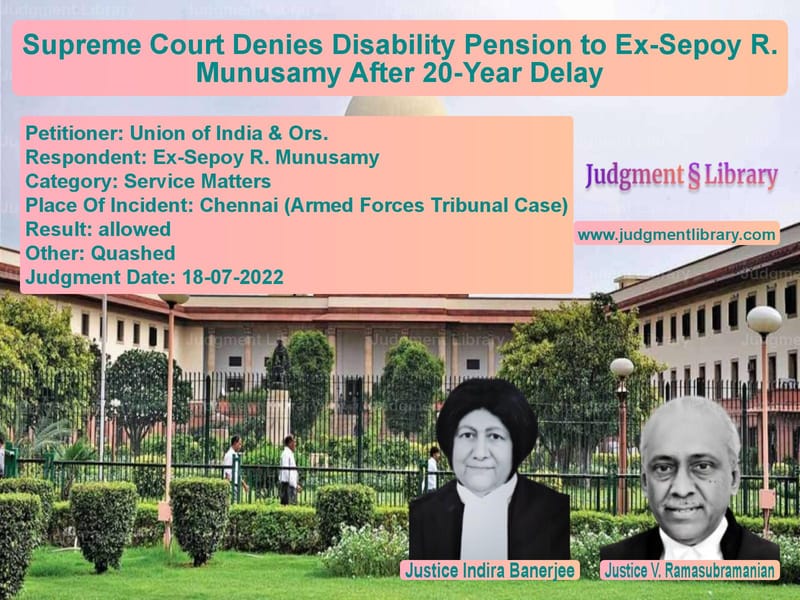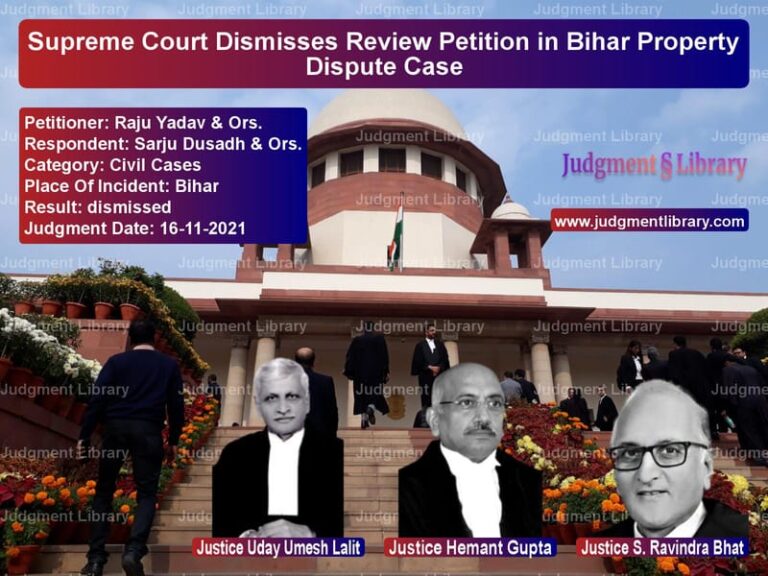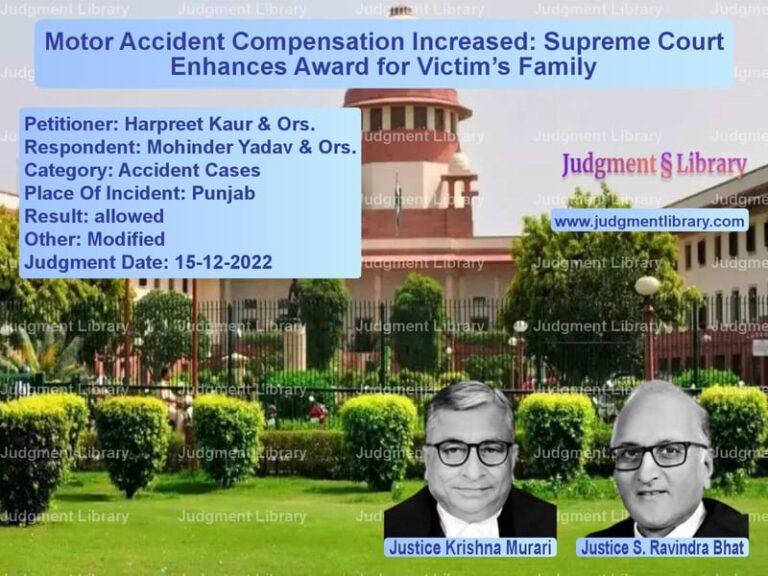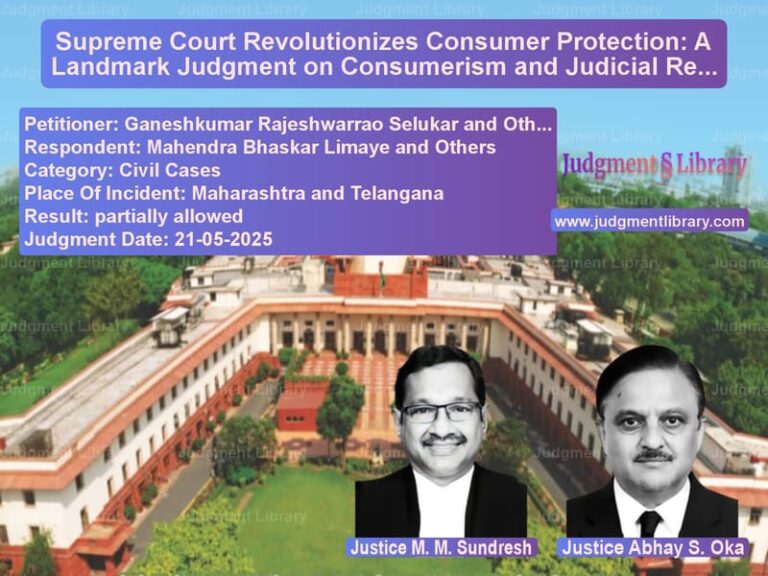Supreme Court Denies Disability Pension to Ex-Sepoy R. Munusamy After 20-Year Delay
The case of Union of India & Ors. vs. Ex-Sepoy R. Munusamy was a significant ruling by the Supreme Court concerning disability pensions in the Indian Army. The ruling examined whether a former soldier could claim disability pension 20 years after discharge and whether the Armed Forces Tribunal (AFT) was correct in granting relief.
A bench comprising Indira Banerjee and V. Ramasubramanian reviewed the decision of the AFT, Chennai Regional Bench, which had granted disability pension to the respondent. The Supreme Court overturned the AFT ruling, emphasizing that claims for disability pension must be filed within a reasonable timeframe and must be supported by clear medical evidence linking the disability to military service.
Background of the Case
The respondent, Ex-Sepoy R. Munusamy, was enrolled in the Indian Army on March 26, 1987. However, he was discharged from service on April 5, 1997, under Rule 13(3) III(v) of the Army Rules, 1954, for being an “undesirable soldier.” He had served for nine years, seven months, and one day, excluding 161 days of non-qualifying service.
At the time of his discharge, a Release Medical Board was conducted on January 30, 1997. The Board diagnosed him with “Right Partial Seizure with Secondary Generalization 345”, which was assessed as 20% disability for two years. However, the Board concluded that the disability was neither attributable to nor aggravated by military service (NANA).
After being discharged, Munusamy did not challenge his dismissal or claim disability pension immediately. His initial claim for a disability pension was rejected on May 19, 1998, by the Office of the Chief Controller of Defence Accounts (Pensions), Allahabad.
Delay in Filing Claim
Despite his rejection, Munusamy did not take any further legal action until October 6, 1998, when he filed an appeal against the rejection of his disability pension. This appeal was dismissed on January 11, 2000. For the next 17.5 years, he took no further action.
Finally, on August 25, 2017—almost 20 years after his discharge—Munusamy sent a legal notice claiming disability pension. He cited the Supreme Court judgments in Dharamvir Singh vs. Union of India and Rajbir Singh vs. Union of India as grounds for his claim.
Red Ink Entries and Disciplinary Issues
The government argued that Munusamy had been discharged due to serious disciplinary issues, not medical reasons. He had accumulated seven red ink entries for offenses, including multiple instances of unauthorized absence and rigorous imprisonment in military custody. These included:
- 28 days of imprisonment on October 25, 1990
- 14 days of detention on April 25, 1991
- 28 days of rigorous imprisonment on September 5, 1993
- 28 days of rigorous imprisonment on May 30, 1994
- 28 days of rigorous imprisonment on June 22, 1995
- 28 days of rigorous imprisonment on September 12, 1995
- 28 days of rigorous imprisonment on February 14, 1996
Due to his repeated breaches of military discipline, the Army considered him an inefficient soldier and discharged him under administrative grounds.
Tribunal Ruling and Supreme Court’s Review
Despite the long delay, the Armed Forces Tribunal (AFT) granted Munusamy’s request in 2018, directing the Army to conduct a fresh Review Medical Board and reassess his disability status. The Board reassessed his disability at 20% for life, prompting the Tribunal to award him disability pension.
The Union of India challenged this decision before the Supreme Court, arguing that:
- The respondent was discharged for disciplinary reasons, not medical disability.
- The 20-year delay in filing the claim was unreasonable.
- The disability was declared not attributable to military service at the time of discharge.
- The AFT had wrongly relied on past judgments, such as Rajbir Singh, which applied only to cases where soldiers were invalidated from service due to medical reasons.
Supreme Court’s Observations
The Supreme Court made several critical observations:
- “For over 20 years from the date of discharge, the respondent did not challenge his dismissal.”
- “His discharge was not on medical grounds but on administrative grounds due to disciplinary infractions.”
- “A Review Medical Board held 20 years after discharge cannot override the findings of the original Medical Board conducted at the time of release.”
- “The Tribunal erred in directing the reassessment of disability two decades later, as medical evidence from that period cannot accurately determine the nature and cause of the disability.”
- “Rule 14 of the Entitlement Rules applies only when a soldier is invalidated out of service due to a medical condition, which was not the case here.”
The Court ruled:
“The Tribunal patently erred in proceeding on the assumption that any ailment or disability detected after recruitment would entitle a soldier to disability pension, irrespective of whether the discharge was due to medical reasons.”
Final Judgment
The Supreme Court overturned the AFT ruling, stating that Munusamy’s claim for disability pension was not justified. The Court held that:
- The respondent’s discharge on administrative grounds was final and could not be reopened.
- His disability, if any, was not shown to be related to military service.
- The Tribunal’s direction to conduct a medical review after 20 years was legally unsound.
- There was no justification for awarding disability pension when the original Release Medical Board had classified the disability as not attributable to service.
This ruling reinforces the importance of timely claims for disability pensions and clarifies that past Supreme Court judgments on disability pension cannot be applied universally to all cases.
Petitioner Name: Union of India & Ors..Respondent Name: Ex-Sepoy R. Munusamy.Judgment By: Justice Indira Banerjee, Justice V. Ramasubramanian.Place Of Incident: Chennai (Armed Forces Tribunal Case).Judgment Date: 18-07-2022.
Don’t miss out on the full details! Download the complete judgment in PDF format below and gain valuable insights instantly!
Download Judgment: union-of-india-&-ors-vs-ex-sepoy-r.-munusamy-supreme-court-of-india-judgment-dated-18-07-2022.pdf
Directly Download Judgment: Directly download this Judgment
See all petitions in Pension and Gratuity
See all petitions in Disciplinary Proceedings
See all petitions in Judgment by Indira Banerjee
See all petitions in Judgment by V. Ramasubramanian
See all petitions in allowed
See all petitions in Quashed
See all petitions in supreme court of India judgments July 2022
See all petitions in 2022 judgments
See all posts in Service Matters Category
See all allowed petitions in Service Matters Category
See all Dismissed petitions in Service Matters Category
See all partially allowed petitions in Service Matters Category







